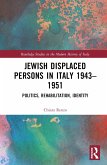The racism and antisemitism of Fascist Italy have often been described as 'mild', 'cultural', 'spiritual', and essentially non-violent, especially in comparison with the racial ideology of Nazi Germany. This book challenges this simplistic interpretation with a thorough analysis of the texts and images of the magazine La Difesa della razza (Defence of the race), the principal public voice of Fascist biological racism, which appeared fortnightly between 1938 and 1943 under the editorship of Telesio Interlandi, Mussolini's 'unofficial mouthpiece', with governmental financial support.
A negative icon of the propaganda of Fascist racism, La Difesa della razza first appeared in August 1938 shortly before the passing of Italy's Racial Laws, but had a long gestation. It was the expression of a Fascist cultural milieu - journalists, writers, artists, and architects - headed by Interlandi, whose racism and antisemitism dated back to the end of the First World War.
By placing the magazine's emergence in this longer timescale, and exploring the interrelationships of political action, ideological discourse, and imagery, this book also demonstrates how the project of 'anthropological revolution' - building the New Man - was a central element of Italian Fascism, from the very beginning to the deportation of Italian Jews.
This new English edition has been thoroughly revised and updated.
A negative icon of the propaganda of Fascist racism, La Difesa della razza first appeared in August 1938 shortly before the passing of Italy's Racial Laws, but had a long gestation. It was the expression of a Fascist cultural milieu - journalists, writers, artists, and architects - headed by Interlandi, whose racism and antisemitism dated back to the end of the First World War.
By placing the magazine's emergence in this longer timescale, and exploring the interrelationships of political action, ideological discourse, and imagery, this book also demonstrates how the project of 'anthropological revolution' - building the New Man - was a central element of Italian Fascism, from the very beginning to the deportation of Italian Jews.
This new English edition has been thoroughly revised and updated.








